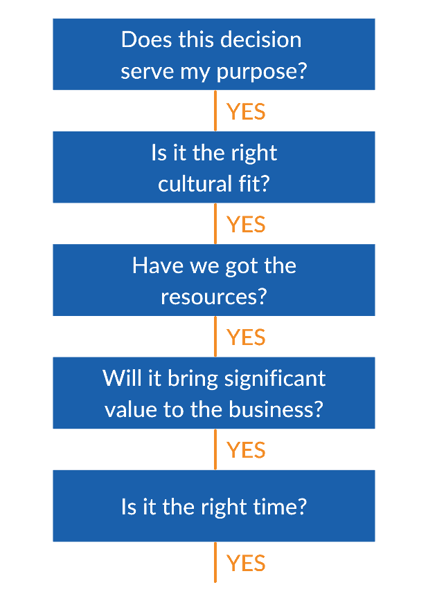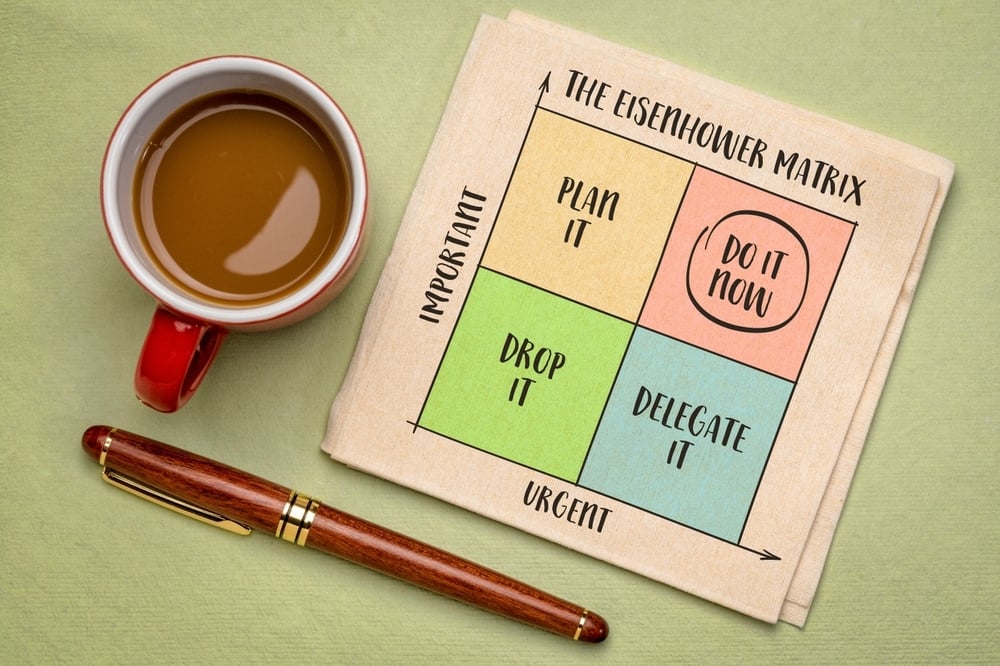.jpg)
Four Approaches to Avoid Poor Decision Making in Business
by The Alternative Board (UK)
Listen to Audio Version:
Last Updated: 11 March, 2025
Decision-making is arguably the most important skill a business leader needs to master. Every day business owners and leaders face difficult decisions that have implications for them, their business, and their staff. Some decisions are small, others are huge. The hardest probably include letting people go, reversing a previous decision, or doing something that might damage your reputation.
It can be overwhelming. It can be a challenge.
Therefore, in the interest of looking after business owners and leaders, we’ve put together this guide to help you make the best decisions you can for everyone involved in your business. So, without further ado, let’s dive into four approaches to avoid poor decision making in business.
🔹 Related: Scientific Decision Making: How to Learn from the Best
Some great frameworks for decision-making in business
The most important thing when it comes to business decision-making is to ensure that your decisions are well-informed, logical, and support the overall objectives of the business and you, as the business owner. To improve your decision-making skills, it may help to follow a set structure or framework for each decision. These approaches help to achieve that goal.
1. Start with Purpose
A key approach to good decision-making is to start with your purpose. Simon Sinek’s Start with Why provides a framework upon which ‘organisations can be build, movements can be led, and people can be inspired. And it all starts with WHY.’ He emphasises that great leaders realise that people won’t simply buy into a product, but they buy into the ‘why’ - the purpose behind it.
What are your company's vision and values? What is your personal vision? Do you even have one? Why did you start your business in the first place?
These questions are crucial when it comes to your decision-making. To drive your business forward through the decisions you make as a leader, never lose sight of your purpose. You might think that this is irrelevant for some decisions. However, in the day-to-day firefighting and distractions of running a business, it’s easy to make knee-jerk decisions based on a narrow view you may have.
Take the time to step back and check.
Ask yourself: "Does this decision fit my company's purpose and vision? Or will it derail what I'm trying to achieve?"
Once you’ve determined that a decision serves your purpose, work down a simple flow chart like this one.
If you can answer ‘yes’ to all these questions, your decision will most likely be a good one.
2. Weigh up the options with a SWOT Analysis
You must find the right decision-making framework for you, but what happens if you need to weigh up two options against each other? This is where you could use an effective SWOT analysis approach. A SWOT analysis is the aspect of your business strategic plan where you look at your business’s strengths, weaknesses, opportunities, and threats. You can apply this logic to each of your potential decisions.
Helen Mill, the TAB Facilitator in North East Scotland, has provided her ‘Options Appraisal’ template to help us guide you through this:
A vital element of this approach is having a ‘status quo’ option—what would happen if things were to stay the same?
Then, list two or three other options along the top row with a description of each. You can then select the most important outcomes – these might be subjective or objective.
With these outcomes in mind, you can then evaluate how each decision will affect that particular outcome. For example, if you decide to stick to the status quo instead of expanding your distributors, you will see no change in the outcome of improving your margins.
Finally, you can capture key elements of your SWOT analysis for each option to get a clearer picture of what each decision would mean for you and your business.
🔹 Related: The secret to an effective SWOT analysis for business owners
3. Confront the brutal facts and adopt a good mindset
When making an important business decision, it is imperative you have all the information. This reminds us of the Stockdale Paradox and how it helps leaders to adopt a good mindset in the face of the hardest decisions they must make.
The paradox comes from the experiences of James Stockdale, a naval officer and Vietnam prisoner of war. Through his interactions with Stockdale, Jim Collins, Author of Good to Great, dubbed a particular trait or mindset as The Stockdale Paradox.
It goes like this:
"Stockdale had said that he needed ‘on the one hand unwavering faith that you can and will prevail in the end, and at the same time, you need the discipline to confront the brutal facts as they actually are.
Collins and his team noticed that the “leaders of the good to great companies embodied the same duality.”
So, when it comes to tough decisions that can be hard to stomach, adopt this mindset: Confront the brutal facts of your situation, resisting any emotion, knowing it is the right decision for you and your business to grow. You will prevail in the end!
4. Have a support network
“A problem shared is a problem halved,” as the old saying goes.
Making effective business decisions can be significantly simplified by sharing them with a support network. One of the best recommendations we can give is to get the right people around you for you, who can not only advise you but challenge you on your critical thinking and decision making.
This might be your own board of directors, or a select group of trusted friends, a business coach or consultant, or even a peer advisory board. By allowing others to give an external perspective on the decisions you need to make, you are allowing yourself to think differently. These opinions can help to weigh up your options as mentioned earlier or give you alternatives you’d never even considered.
For example, Lee Johnson, owner of Advanced Electrical Services in Leeds said: “The Alternative Board has been a vital resource to challenge my ideas and enable me to make better decisions. Working on a Business Advisory Board with other like-minded business owners from various sectors has enabled me to access support, experience and knowledge to help me to run my company.”
This is just one person’s take on the value that a support network can contribute to a leader’s ability to make effective decisions for their business, which allows themselves, the business, and staff to thrive.
🔹Find Your Local TAB Facilitator →
How to Avoid Poor Decision Making
We also want to highlight some key things to avoid when making decisions. This will prevent you from making poor decisions for your business.
1. Avoid using your emotion
When your business is your baby, it is inevitable that you will make decisions based on emotions. However, the problem can come when you don’t take a step back. We should view these decisions from an outsider’s perspective rather than instantly making decisions in anger or any other emotion. This can be incredibly hard but is crucial to the long-term success of businesses.
🔹 Related: Reasons why Emotional Decision Making is Killing your Business and How to Stop It.
2. Don’t dither
There’s nothing worse for a team than a leader who is indecisive. Don’t go back and forth on a decision; not only does it compromise your leadership and trust, but it can also significantly delay progress. If you find yourself struggling with a decision, follow one of the decision-making approaches we’ve laid out in this guide or ask others for guidance.
You can also correct a wrong decision. You can put it right and move on. Indecision? You haven’t a hope.
3. Use Your Team
There is no reason why, with certain decisions, your team can’t be involved in the process. You could even think about creating a planning team for decision-making. Having your team involved in key decisions in business not only takes some pressure off you, even though the responsibility is ultimately yours, but it also means they feel more involved in the direction the company is going. This will improve employee motivation and retention rates. Everyone’s a winner!
Some final top tips on decision-making from our expert TAB Facilitators…
“Leadership involves a lot of decision making and you won’t always get it right. But making a decision, explaining why, and communicating it clearly is far better for the teams you are leading, than someone who prevaricates, changes their mind or is indecisive.” Paul Winterbottom, TAB Manchester West
“Do the right thing for the right reason, then deal with the consequences.” Helen Mill, TAB North East Scotland
“Know your cognitive biases.” Jonathan O’Shea, TAB Bristol North
By adopting some of these tips, you’re making significant strides towards improving your decision-making skills and your leadership capabilities. But, if you’re hungry for more, find your local TAB advisory board and facilitator to get expert advice from like-minded business owners in your area.
🔹Related: Learn More About Our Business Growth Consultancy Services →
Related articles

Seven things for leaders to consider about the 4-day work week
Considering a 4-day work week for your staff? Here are seven key things to consider before making the decision to have a 4-day working week.

Why such a rush? A marathon not a sprint
We live in a world of speed where we expect everything at a click of a finger. How should business owners be making decisions?

Ben Stokes’ Wager – and what it means for Entrepreneurs
Ed delves into the essence of entrepreneurial decision-making, risking comfort for potential reward, and high-stakes choices.






